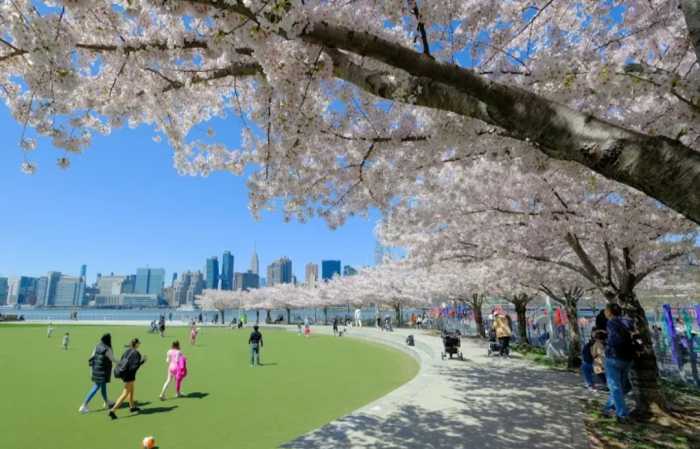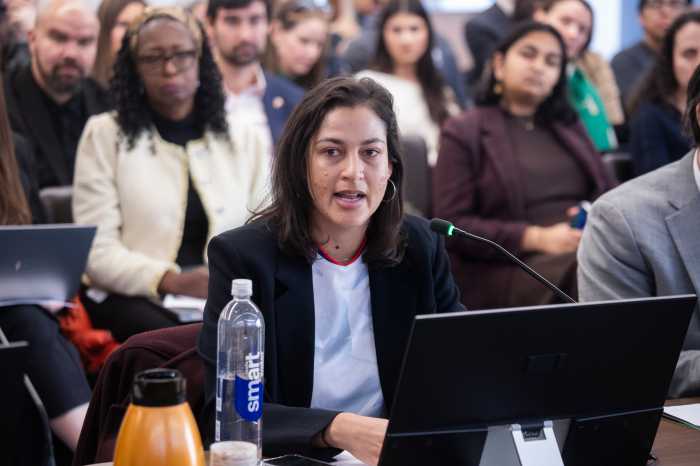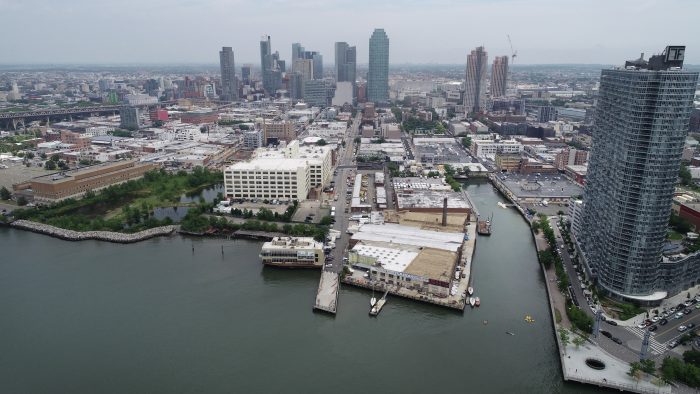
An aerial view of Anable Basin, where Amazon planned on building new headquarters. (Kevin P. Coughlin/Office of Governor Andrew M. Cuomo)
Feb. 14, 2019 By Nathaly Pesantez
A deal brokered three months ago that named Long Island City home to one of Amazon’s newest campuses has now collapsed after the company called off its plans earlier today in a striking announcement met with both exaltation and fury across the spectrum.
The Seattle-based company, in a lengthy statement published just before midday, said it decided not to move forward with its plans for Queens because of the opposition it faced, especially from city and state officials.
“While polls show that 70% of New Yorkers support our plans and investment, a number of state and local politicians have made it clear that they oppose our presence and will not work with us to build the type of relationships that are required to go forward with the project we and many others envisioned in Long Island City,” the company said, adding that it was “disappointed to have reached this conclusion.”
Reactions to the decision were swift, coming in from activist groups that vocally opposed the deal and basked in its demise, to real estate industry experts stunned at the lost opportunities, to officials who either blamed Amazon for its own decision or pointed fingers at the politicians that were sharply critical of the project.
Mayor Bill de Blasio said, “you have to be tough to make it in New York City,” and that Amazon, rather than work with the community, “threw away that opportunity.”
Governor Andrew Cuomo, who Amazon said it was “deeply grateful” to along with de Blasio for heralding the deal since the start, said the company’s decision comes after “a small group of politicians put their own narrow political interests above their community.”
While not naming the “group of politicians,” central to HQ2 opposition efforts were State Sen. Mike Gianaris and Council Member Jimmy Van Bramer, which represent the area Amazon was planning on locating its Queens campus.
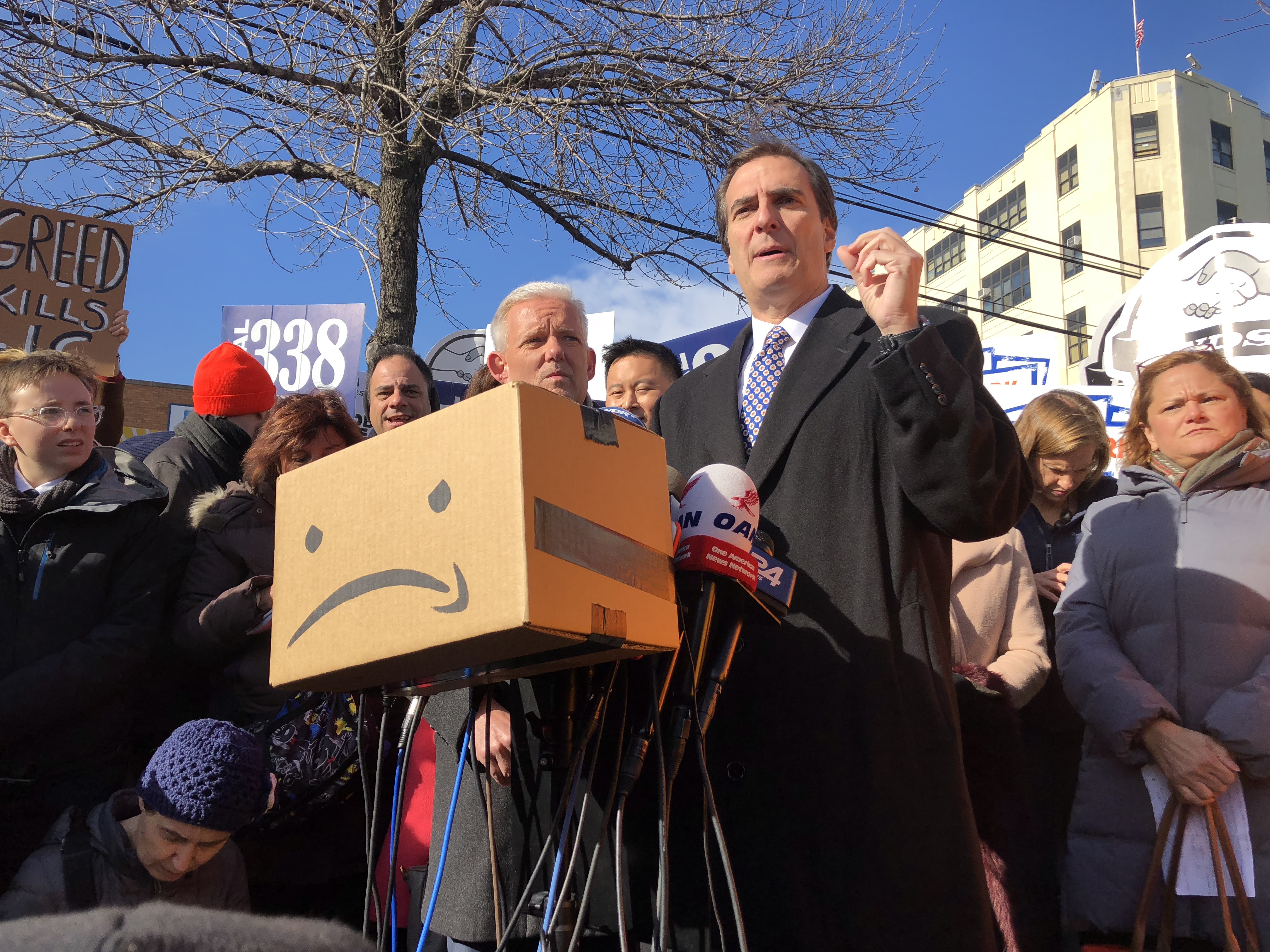
State Senator Michael Gianaris at the “No to Amazon” rally on Nov. 15. (Photo: Nathaly Pesantez)
Both Gianaris and Van Bramer celebrated the deal’s collapse, with Gianaris believing that the surprise decision demonstrated Amazon would have been “a bad partner” for the city, and Van Bramer noting that the news is “a victory.” He would later say that Amazon chose to leave rather than adapt to concerns laid out by him and other critics of the plan.
The responses were similar to those given by a number of organizing activist groups, mostly based in Queens, that fought hard for the deal to be scrapped on the grounds that it circumvented local review and gave away too much in tax incentives to the company; that it would fuel gentrification; and the e-commerce giant’s labor record and business dealings with Immigration and Customs Enforcement, among other concerns.
In a joint statement, groups like ALIGN, CAAV, Make the Road and Chhaya CDC quipped that the announcement, made on Valentine’s Day, is a “It’s not us, it’s you” message from New Yorkers to the company.
“This victory is a clear demonstration of the power of workers and communities across Queens and New York who came together and are fighting for a city that works for us and not for billionaires like Bezos,” the groups said. “We will continue fighting for real investment for good jobs, affordable housing, NYCHA, and transit in our communities and we will continue to stand in solidarity and support of other cities and communities facing Amazon and Bezos’s bullying tactics.”
The groups had recently canvassed and collected hundreds of signatures at the Queensbridge Houses in a “No Amazon Day of Action,” an event followed days later by a press conference where a number of tenant association presidents from public housing complexes in Queens and other area leaders spoke to their interest in seeing the project thrive, and rebuked the outright rejection to the plan.
The activist organizations also gathered at Gordon Triangle on Vernon Boulevard, close to where Amazon had sited the Long Island City and where a large anti-Amazon rally was held in November after the HQ2 announcement, this afternoon in a celebratory rally. The groups will also be at Diversity Plaza in Jackson Heights later this evening for another victory rally.
The Hunters Point rally was also attended by members of the The Retail, Wholesale and Department Store Union, which had denounced Amazon’s anti-union stance and was critical of Amazon’s choice to pull out from the project rather than engage in efforts to allow its employees to unionize.
RWDSU's Dave Mertz on @Amazon cancelling its HQ2 project: "Throughout this process, Amazon's behavior has been despicable. All New Yorkers were asking was for this company to respect our values, and they turned tail and said no." #1u pic.twitter.com/xxGXo1BgJ5
— RWDSU (@RWDSU) February 14, 2019
New York’s real estate sector bemoaned the reversal, especially after Amazon’s Long Island City campus announcement fueled the market and even “sparked a condo frenzy.” The Real Estate Board of New York said the decision means, “we have lost out on an opportunity to create tens of thousands of jobs for city residents and generate billions of dollars in tax revenue to fund vital services.”
“Nevertheless, New York City is still open for business and will retain its status as a world class center for tech and innovation,” said John H. Banks, REBNY president.
Eric Benaim, the CEO of the Long Island City-based Modern Spaces, and a fervent supporter of HQ2, said Amazon’s decision is a mistake.
“Because of this decision, 25,000 jobs were lost, 25,000 people won’t be able to afford groceries and 25,000 people will potentially remain unemployed,” he said. He last created a petition about one week ago that has since gained about 3,900 signatures in support of the Long Island City campus.
While he previously expressed fears that Amazon’s departure due to opposition would scare other companies away and dent the market, he noted things will operate “business as usual after this news passes.”
“…The real estate market was hot well before Amazon announced HQ2 and it will stay hot well after,” he said. “LIC was named the fastest growing city in the country and it will only continue to grow in the years to come.”
The LIC Partnership, which works to bolster economic development in the neighborhood and vouched for the campus, said the news was a “tremendous disappointment,” but noted that the spotlight on Long Island City shows its potential for future development and growth.
“On the brighter side, the world is getting to see what Long Island City has to offer as a home for great companies and great people,” the partnership said.
In the wake of the bombshell announcement, many sought comment from Congresswoman Alexandria Ocasio-Cortez, whose progressive platform and popularity has worked to shifted the party and its members since she defeated former Rep. Joe Crowley in a primary last year.
Her hard-no stance on Amazon and criticisms over the corporation’s record are believed to have fueled the vocal opposition seen by electeds like Van Bramer, Gianaris and others, many who initially signed a letter in 2017 urging the company to consider New York for its new campus.
“Anything is possible: today was the day a group of dedicated, everyday New Yorkers & their neighbors defeated Amazon’s corporate greed, its worker exploitation, and the power of the richest man in the world,” she said on Twitter.
In response to a reporter’s tweet on whether her impact on the crumbled Amazon deal was being overrated, she said: “I think so. Grassroots community members led + organized the whole effort. Wouldn’t have happened if they weren’t there.”
Amazon had planned on building a campus spanning 4 million square feet, with the potential for more, at Anable Basin some time in 2020, when the state approvals process it was going through to rezone the waterfront blocks was expected to conclude.
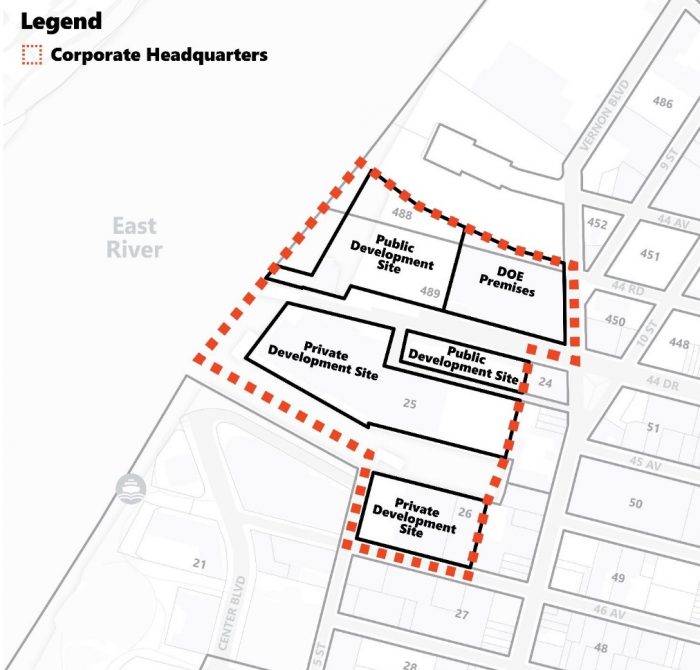
Location for the now-scrapped Amazon campus in Long Island City (EDC)
Some of the lots under consideration are publicly owned, while the private lots are owned by Plaxall, the plastics manufacturer based in Long Island City. Both the city and Plaxall had separate plans to bring two large developments to the properties, but scrapped the plans once Amazon selected the parcels for its campus project.
“We’re extremely disappointed by this decision,” said Paula Kirby, Tony Pfohl and Matthew Quigley, managing directors of the company, in a joint statement. ” Since our grandfather opened Plaxall’s doors on the waterfront seven decades ago, our family has believed in the overwhelming promise of Anable Basin and Long Island City as centers of productivity and innovation. We continue to believe that today.”
It is unclear what will become of the prime city and Plaxall-owned lots. Plaxall declined to comment on whether it would pursue its prior plans that called for up to 5,000 apartments, including a 695-foot tower, at the basin.


